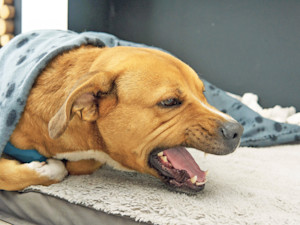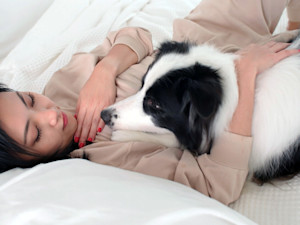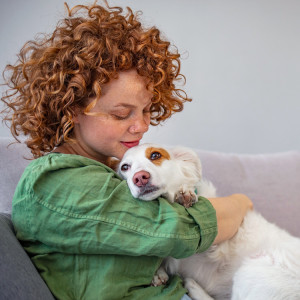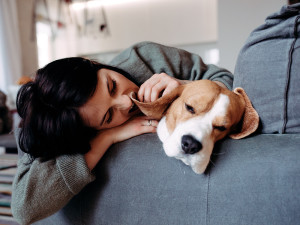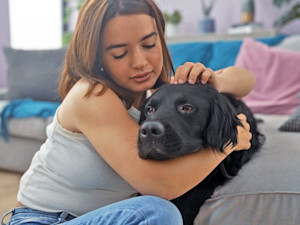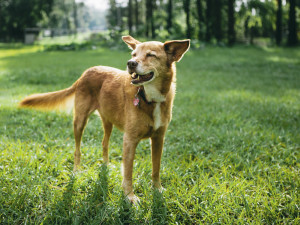Why Does My Dog Cough After Drinking Water?
An expert weighs in on when it’s totally fine, and when you should start to worry.

Share Article
In This Article:
Why Dogs Cough After Drinking Wateropens in a new tab When a Cough Requires Medical Careopens in a new tab How Do Vets Treat Coughing in Dogs?opens in a new tab Home Remedies for Minor Coughing opens in a new tab Dog Coughing Prevention Tipsopens in a new tab
If you’ve had a dog for a while, you’ve probably heard them cough after drinking water. Every dog does it — just like we occasionally cough after swallowing something. Normally, it’s nothing to worry about. However, you may start worrying about your dog if the coughing becomes frequent.
Your dog can cough excessively after drinking water for numerous reasons. A pet parent needs to know why and what to do if it gets severe. That’s because in some cases there are serious causes that need to be addressed for your pup’s health and happiness.

littleKin™ is Kinship’s home just for puppy and kitten parents. Bop over to check out expert advice, new pet tools, and special deals—all curated for your newest family member.
opens in a new tabMain takeaways
Many dogs cough after drinking, and that’s normal and requires no treatment.
But there are also serious illnesses that can cause dogs to cough.
You should see your vet if there are additional symptoms accompanying the cough.
Home remedies and vet treatments for a coughing dog depend on the severity of the cough.
Why dogs cough after drinking water
There are many reasons why dogs cough after drinking water. We will explain 12 of the most common ones.
Water in windpipe
Your dog’s windpipe (the common name for the trachea) is the tube that carries air from their throat to their lungs. There’s another tube-like structure alongside the trachea called the esophagus, which carries food and water from their mouth to their stomach. If water goes down the trachea instead of the esophagus, it will cause a dog to cough. This most often happens when your dog drinks too quickly or at an awkward angle. Coughing is a reflexive action to clear and protect the airways.
Reverse sneezing
Reverse sneezing — often mistaken for coughing — is like a sneeze, but the air comes in the nose instead of out of it. It is usually a harmless condition caused by irritation or inflammation in the soft palate or throat. Stimulation of sensitive areas by drinking water may be the cause of this reaction. It can be scary to hear and see, but it is usually harmless. If it starts happening too frequently, see your vet.
Respiratory issues
Coughing after drinking water can be caused by infections such as kennel cough or pneumonia. Other symptoms may include lethargy, fever, or nasal discharge. You should take your pup to the vet if they have any of these symptoms.
Windpipe problems
A collapsed trachea in dogs is a condition where the cartilage rings that support the trachea (or windpipe) weaken, causing the trachea to become flattened. This can lead to airway obstruction, resulting in coughing and breathing difficulties. Here are the primary causes of, and contributing factors to, this:
Genetics
Age
Obesity
Chronic respiratory conditions
Environmental factors
Congenital defects
Hormonal imbalances
Your dog could also have problems with the actual anatomy of their trachea.
Foreign bodies
Dogs are famous for eating anything they can get their noses into. They go through trash cans, eat parts of toys, and chew on plants and outdoor bushes. It’s not uncommon for foreign objects to become stuck in a dog’s throat or esophagus. If that dog then drinks water, this can increase the irritation caused by the foreign body and cause coughing. Additional symptoms can include difficulty swallowing, pawing at the mouth, and gagging. This is a vet emergency.
Aspiration pneumonia
If your dog is having difficulty swallowing for any reason, drinking water may cause them to aspirate water into their lungs through the trachea. This can lead to aspiration pneumonia, which is a very serious condition. Symptoms include persistent coughing, labored breathing, and lethargy. If this appears to be happening, take them to a vet right away.
Allergies
If your dog is allergic to food or has environmental allergens, their throat can become irritated. If your dog drinks with an irritated throat, that can make them cough. This will necessitate identifying the allergen so it can be avoided. Your vet will also probably prescribe medications to help manage allergy symptoms.
Cancer
Unfortunately, dogs get cancer, including tumors in their respiratory or digestive tracts. This can cause physical obstruction or irritation, leading to coughing after drinking. Additional symptoms include coughing up blood, weight loss, and difficulty breathing. This requires immediate vet attention.
Bronchitis
Bronchitis in dogs refers to the inflammation of the bronchial tubes, which are a part of the lungs. This can be caused by several factors.
Infections: Viral, bacterial, or fungal infections such as kennel cough, a contagious respiratory infection
Allergies: Irritation from environmental allergens such as pollen, dust, mold, or smoke — which irritate the respiratory system
Irritants: Prolonged exposure to smoke, strong chemicals, or air pollution that irritates the airways and causes inflammation
Parasites: Lungworms and other worms that infect the respiratory system
Underlying conditions: Heart disease or tracheal collapse which increases a dog’s bronchitis risk
Chronic Obstructive Pulmonary Disease (COPD): Long-term respiratory problems that develop into chronic bronchitis in older dogs or those with underlying health issues
Immune system disorders: Autoimmune conditions that affect the respiratory tract
Heartworms
Canine heartworm disease is a severe and potentially life-threatening condition that can affect the heart and lungs. It can cause coughing, especially after drinking and exercise. There are preventative medications you can give your dog and tests to make sure your dog doesn’t suffer from heartworms.
Congestive heart failure
There are several different types of canine heart disease. To know for sure if your dog has a heart condition — and which one it is — they’ll need a cardiac ultrasound (or echocardiogram). A murmur is often heard when a dog has a heart condition. Other symptoms include difficulty breathing, fatigue, and possibly a swollen abdomen. There can be fluid buildup in the lungs, leading to coughing that may worsen by drinking water. Vet intervention is needed right away.
Tracheal collapse
A collapsing trachea is a common cause of coughing in smaller dog breeds and may be aggravated by drinking water. Treatment options include weight management, medications to reduce inflammation, and in severe cases, surgical intervention.
How to determine between a normal cough and one that needs medical care
As previously mentioned, there are many times when a dog’s cough is completely normal and doesn’t need treatment. One example is reverse sneezingopens in a new tab. But there are other times when failing to get help from a vet can be detrimental to their health.
When should you seek veterinary assistance?
Veterinary care is essential if the cough persists — or worsens over time — and is accompanied by other symptoms such as lethargy, loss of appetite, and difficulty breathing. Make a video to show your vet, and keep a record of when, and how often, the coughing occurs.
How do vets treat coughing in dogs?
There are many different treatmentsopens in a new tab for coughing in dogs. If the cause of this is an infection, the treatment may be antibiotics. If it’s bronchitis, the treatment may be anti-inflammatory medication. Some circumstances, such as a tracheal collapse or a tumor, may involve surgery. Diagnostic tools like X-rays, blood tests, and endoscopies may be used to pinpoint the issue.
Home remedies for minor coughing
If your dog’s cough is minor and infrequent, you can try treating them at home. One of the most important things to do is keep your dog well-hydrated. Always have fresh water available, and if your dog needs encouragement to drink, try giving them some low-sodium chicken broth, either alone or flavoring the water.
It is helpful to place a humidifier in the areas where they spend their time. Also, make sure they get enough rest, which is helpful for all illnesses. Avoid exposure to allergens or irritants like smoke or strong fragrances. With your vet’s approval, you can give your dog small amounts of honey, which is enormously soothing for an irritated throat.
Dog coughing prevention tips
Hydration
Your dog should always be hydrated, even when they’re not ill. Encourage your dog to drink slowly and provide fresh, clean water. This can help reduce irritation and coughing risks. Special water bowls designed for slow drinking can be helpful for dogs who gulp water too quickly.
Health check-ups
Regular veterinary check-ups can identify and manage underlying conditions before they worsen. It’s much better to treat issues early to preserve their long-term health. Vaccinations can prevent some respiratory illnesses. Likewise, parasite prevention can keep lungworms and heartworms away. Your veterinarian will also listen carefully to your dog’s heart and lungs, even at preventative visits, to spot something like a murmur early on, which can be lifesaving.
Environmental adjustments
Minimize exposure to irritants like dust, pollen, and household chemicals. If your dog is prone to allergies, consider using air purifiers and hypoallergenic bedding. Allergy testing is available by skin or blood test, and the results can be very helpful.
Diet and weight management
Feeding them a healthy diet and making sure they maintain an appropriate weight can reduce strain on your dog’s respiratory and cardiovascular systems — lowering the risk of conditions such as tracheal collapse and congestive heart failure. Portion control or a special low-calorie diet can help your dog lose weight. Speak to your vet to determine an appropriate diet.
References
De, Helio. “Why Is This Patient Coughing? (Proceedings).” DVM 360, Apr. 2008, www.dvm360.com/view/why-patient-coughing-proceedingsopens in a new tab. Accessed 24 Dec. 2024.
Hsieh, Brisa M., and Alicia K. Beets. “Coughing in Small Animal Patients.” Frontiers in Veterinary Science, vol. 6, 21 Jan. 2020, www.ncbi.nlm.nih.gov/pmc/articles/PMC6985277/opens in a new tab, https://doi.org/10.3389/fvets.2019.00513opens in a new tab.
Johnson, Lynelle R. “Laryngeal Structure and Function in Dogs with Cough.” Journal of the American Veterinary Medical Association, vol. 249, no. 2, 15 July 2016, pp. 195–201, https://doi.org/10.2460/javma.249.2.195opens in a new tab. Accessed 2 Feb. 2022.

Dr. Shelby Neely, DVM
Dr. Shelby Neely is a freelance writer and veterinarian who graduated from The University of Pennsylvania and has practiced veterinary medicine for 30 years. She has found homes for hundreds of stray pets and has two cats as well as four grand-dogs and two grand-cats. In her spare time, Dr. Neely likes to be with her three children, their dogs and cats, and her own two cats. She also likes to see as many Broadway shows as possible.
Related articles
![Woman with her dog relaxing in living room.]() opens in a new tab
opens in a new tabHow to Tell If Your Dog Is Sick
Look out for these warnings signs so you know when to call the vet.
- opens in a new tab
Can Dogs Get Colds?
We’re all sniffling this time of year. Learn if your pup can get a cold, too.
![Woman cuddling her sick black dog at home.]() opens in a new tab
opens in a new tabDiagnosing Kennel Cough in Dogs: A Comprehensive Guide
When to call the vet.
- opens in a new tab
Why is My Dog Coughing and Gagging?
Let’s figure out this unsettling mystery.
![A dog outside with his mouth open coughing]() opens in a new tab
opens in a new tabRespiratory Illnesses in Dogs: 6 Serious Conditions Related to Coughing in Dogs
Vet advice on when you should be worried.
